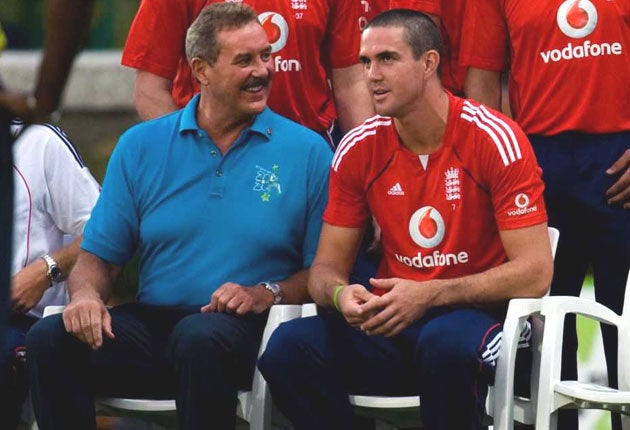Stanford farce forces ECB to act
England and Wales Cricket Board to reassess $20m trip to Caribbean

With the destiny of the bounty yet to be decided, the men running English cricket yesterday announced a review into their relationship with the Texan multi-billionaire Sir Allen Stanford. Three days before the $20m winner take all match is due to be played here it appeared to dawn on the England and Wales Cricket Board that they might have made a catastrophic error of judgement.
Their belated concerns, however, might not prevent serious questions about the futures of the Giles Clarke and David Collier, respectively the ECB's chairman and chief executive. The Stanford Twenty20 Super Series, although at last adorned with a close and thrilling game on Tuesday night in which not a brass farthing was being played for, has been a public relations disaster. Whatever the complications of the deal and however apparently irresistible the money was, the tournament has become less and less desirable by the day.
The cricket has largely been of poor quality, the pitch and the floodlights have been criticised, the backer himself was forced to apologise to England for his faintly curious behaviour with some of the players' wives and the players themselves are fed up with being asked about the loot.
Painfully aware of the opprobrium being shoved in their direction, the ECB probably had no option but to respond – although the other choice was to get out of Antigua with the loot before saying anything. "There are lessons to be learned for us all from the events of this week," said a spokesman. "That was always going to be the case because it is new territory for all of us, the ECB and Sir Allen. With four years of the agreement still to run there may be things we can do differently."
The ECB can say that again. They have this series and a quadrangular Stanford T20 tournament in England for the next four years to survive yet. It may not be their fault that the cricket has not quite lived up to Twenty20 expectations but they should have expected all the scrutiny and scepticism that have emerged this week. From the moment that the ECB and Sir Allen unveiled a case filled with $20m in cash at Lord's last June to be paid for an exhibition match between England and the Stanford Superstars it has been plain that this event has been almost exclusively about the cash and the rich man supplying it.
The photograph of him in close contact with some of the players' partners at England's opening game on Sunday – for which the women have been most unfairly maligned – merely supplemented the vague tackiness of the event. When he was seen joshing in the stands with David Collier the night after (he must tell really smashing jokes) it seemed entirely in keeping.
The players also realise that they face criticism but are being much more thoughtful and less disingenuous than some concerned. As fast bowler Stephen Harmison said yesterday: "I think it is good for the game, but at the wrong time. The game will benefit as well as the players in the long run because the money will filter down to the right places. But at the minute with the squeeze on credit and what's happening in England and the world people will criticise the players."
Collier remains adamant that the ECB had no option but to take the cash. With government funding for all sports down he may have a point and the £3.5m of the pot which will go into the ECB's coffers will be useful, although not so handy as the £13m that might make its way to the players.
It will certainly help to fund the £600,000 that the board loaned to each of the 18 counties earlier this week to get them out of the financial mire. There is a feeling at the ECB that if they had not taken Stanford's cash somebody else might have done. But it has already been a high price to pay.
Join our commenting forum
Join thought-provoking conversations, follow other Independent readers and see their replies
Comments
Bookmark popover
Removed from bookmarks